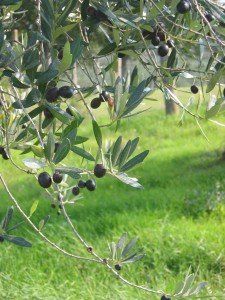 Umbria, as you know, is entirely territory DOP extra virgin. Inside the DOP are identified five sub-areas, for different soil characteristics and climate. The famous sub-area Colli Assisi-Spoleto, for example, is rich soils high in skeleton (crushed stone) and exposed predominantly to the southwest. The area of origin of our oil is instead that of the Colli Martani, richer in clay and marl, with predominant exposure, in our case, to the northeast.
Umbria, as you know, is entirely territory DOP extra virgin. Inside the DOP are identified five sub-areas, for different soil characteristics and climate. The famous sub-area Colli Assisi-Spoleto, for example, is rich soils high in skeleton (crushed stone) and exposed predominantly to the southwest. The area of origin of our oil is instead that of the Colli Martani, richer in clay and marl, with predominant exposure, in our case, to the northeast.
The presence of stones in the soil promotes the formation of volatile substances and aromatic (very fragrant oils, sometimes purpose, but often a bit ‘spicy and unbalanced), while a high clay content and marl more evenly enhances the organoleptic characteristics of product, helping to form a “body” of greater thickness and harmonious taste and a more smooth and round. E ‘likely that the longevity of the product, in the latter case, is greater, although there are no definitive studies in this regard.
The exhibition, however, plays an important role on the development and preservation of aromatics, ethers, esters and varietal characteristics, which are often very delicate. The violence of the sun’s rays on areas exposed to the southwest often ends up “burn” these substances, losing some subtlety, complexity, harmony and structure to the final product (as was the case for the traditional southern Italian wines – and Mediterranean kind – before they were adopted more modern winemaking techniques).
The best position is placed away from direct sunlight, but full of light, which promotes photosynthesis and the formation of sugars. Therefore land places east, northeast, and northwest, seem to be the best (although this is very dependent on latitude, the microclimate and the variety concerned). Nevertheless, it is not uncommon to encounter oil and wine labels that enhance the quality of the product by virtue of the fact that the land of the company are oriented to the south, right into the sun hotter!
It seems that the olive tree heavily exposed (such as those of the Italian south, or North Africa) reacts violent attack of the sun and the climate, producing major components of fatty acids and particularly the less noble and less healthy. The sense of roundness and fat (sometimes even nauseating) that you try bringing to mouth certain oils traditional southern is not accidental.
The olive tree, desert plant, therefore needs a hostile environment to give the best of themselves: more temperate climates and not too hot; poor soils, but not desert; light but not heat.
